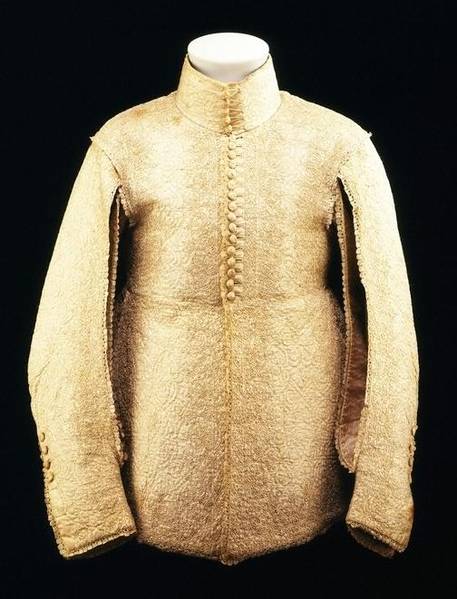File:Doubletvanda.jpg

Summary
Doublet, 1635–1640 V&A Museum no. 177-1900
Techniques – Glazed linen, embroidered with linen thread
Place – England
Dimensions – Width 71.12 cm (maximum, elbow to elbow), Depth 44.5 cm (maximum)
Object Type – Doublets formed part of the ensemble of clothing worn by men in the early 17th century. A pair of breeches in matching fabric would have been worn with this doublet, with a cape to complete the gentleman's outfit.
Materials & Making – The linen has not been dyed but bleached and glazed instead to give a uniform colour and a firm texture on which to embroider. Back stitch, French knots and couching in fine linen thread comprise a pattern of geometric and floral motifs. Linen thread, hand plaited and sewn over a wooden core in a technique known as passementerie, forms the decorative buttons.
Time – A doublet of the late 1630s had a waistline at the natural level with large flaps or tabs, as they were known, falling below. Typical of the period, are the back seam and seams of the sleeves. They have been deliberately left unstitched to allow the billowing shirt to show through from underneath. Fashions of the 1630s featured a high collar over which the falling band of fine linen and lace could drape becomingly.
Licensed CC-BY-SA-3.0, VandAwebteam on English Wikipedia
Licencing
File history
Click on a date/time to view the file as it appeared at that time.
| Date/Time | Thumbnail | Dimensions | User | Comment | |
|---|---|---|---|---|---|
| current | 20:54, May 1, 2018 |  | 504 × 661 (59 KB) | PaulaMarmor (Talk | contribs) | Doublet, 1635–1640 V&A Museum no. 177-1900 Techniques – Glazed linen, embroidered with linen thread Place – England Dimensions – Width 71.12 cm (maximum, elbow to elbow), Depth 44.5 cm (maximum) Object Type – Doublets formed part of the en... |
- You cannot overwrite this file.
File usage
The following page links to this file: